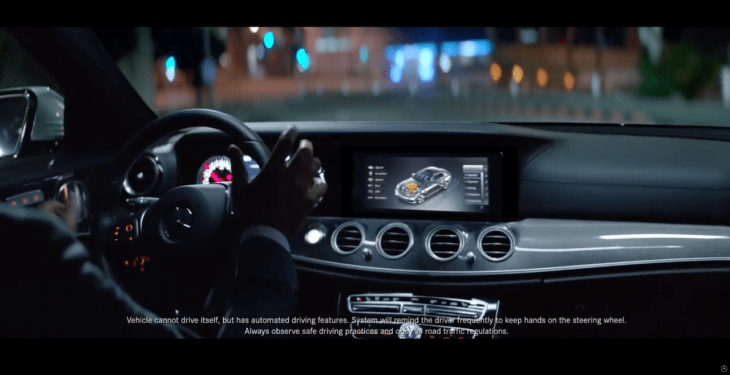A letter to the FTC co-authored by executives from Consumer Reports, the Ralph Nader-founded Center for Auto Safety and the Center for Auto Safety, as well as a former NHTSA Administrator, asks that the federal regulator investigate Mercedes-Benz on the grounds a new TV ad overstates the self-driving capabilities of the 2017 E-Class.
The consumer watchdog organizations are concerned specifically that the ad, embedded above, could lead viewers to believe that the E-Class is effectively an autonomous vehicle, both because it shows a family in another, entirely conceptual car interacting while that sci-fi inspired vehicle drives itself, and also because the driver of the actual E-Class shown in the ad removes his hands from the steering wheel of the car as it navigates itself left, and continues to keep them off while the car parks itself.
The open letter also takes issue with the copy used for the voiceover narration, which does not actually call the E-Class self-driving or fully autonomous, but which does refer to the vehicle as “autonomous-thinking,” with “self-braking, self-correcting, self-parking.” Further, the group cites a print ad which explicitly referred to the E-Class as “a self-driving car,” something which Mercedes has defended as common industry vernacular, and which they attempted to mitigate later in the campaign with additional fine print disclaimers.
The letter doesn’t necessarily mean an official FTC inquiry will follow, but the logic in the letter is sound. Car makers have always taken creative liberties when crafting their TV and print ads, often creating hyper- or surreal slightly altered versions of reality in order to activate the aspirational desires of potential purchasers. But as we move into a world of increasingly automated driving, clarity around what is, and what isn’t, true self-driving might mean some of that traditional creative license gets reined in.
Update: In a statement to Reuters, a Daimler spokesperson denied that the ad was misleading and provided the following statement:
“It was and is not our intent to cause any confusion between current driver assistance systems and the vision of an autonomous future.”
Update 2: Mercedes has now taken the ad out of their rotation and marked the video as private on YouTube as a direct result of the claim made by the consumer group, according to Automotive News.
